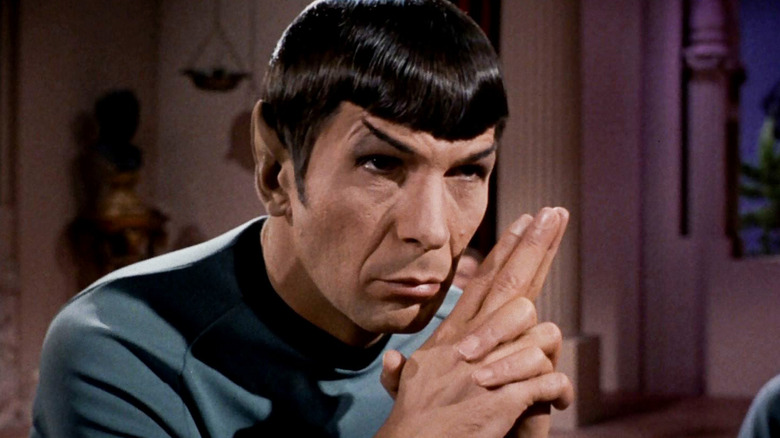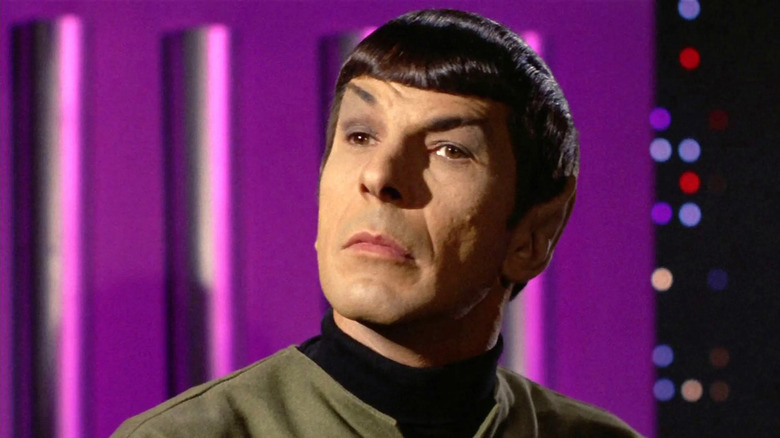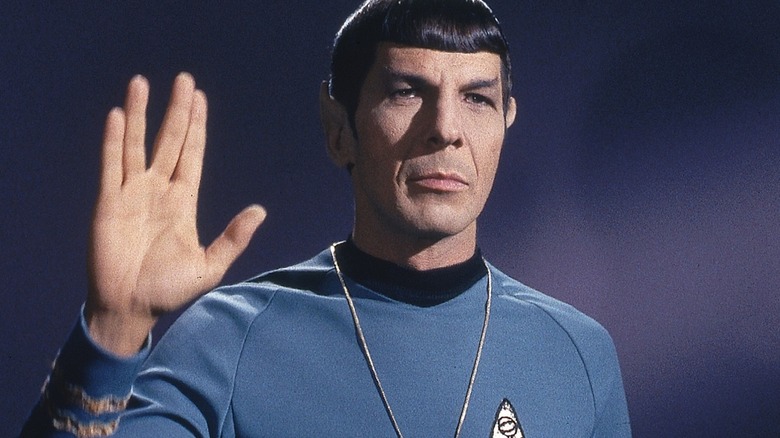Star Trek Almost Had To Axe Spock's Character In Season 2
"Star Trek" has been a massive and ubiquitous piece of popular culture for 57 years, so it's hard to recall the time, back in its early days, when it was struggling to stay on its feet. NBC, who was airing the show in its initial run, was skeptical of every decision made regarding "Star Trek," from the casting to the budget. It was only through the bolstering of Lucille Ball and Desi Arnaz — whose Desilu studio backed Gene Roddenberry's sci-fi project — that "Star Trek" got off the ground in the first place.
But by the second season, NBC and Desilu had swapped positions.
Trekkies will happily tell you all about "The Cage," the original "Star Trek" pilot, which starred a completely different cast of characters. By NBC's demands, the show had to be completely reworked, and every character was replaced, save the Vulcan science officer Spock (Leonard Nimoy). Spock, it seems, was the key to making the show work. Eventually, "The Cage" was re-edited and incorporated into a two-part episode called "The Menagerie." Now part of "Trek" canon, "The Cage" went on to serve as the primary inspiration for the new series "Star Trek: Strange New Worlds," which recast Spock with actor Ethan Peck, the grandson of Gregory Peck.
Spock, then, appears to be a vital and indispensable part of the franchise's success. However, according to the oral history "The Fifty-Year Mission: The Complete, Uncensored, Unauthorized Oral History of Star Trek: The First 25 Years," edited by Mark A. Altman and Edward Gross, Desilu wanted to pull the plug on "Star Trek" or perhaps cut Spock from the lineup. It seems Nimoy's salary was too high.
Trek sans Spock
Spock, of course, was the most striking element of "Star Trek." He was a curious-looking alien with Mephistophelean ears, angled eyebrows, and repressed emotions. His interactions with the Enterprise's human crew members were a highlight of the show, and his presence may be considered its primary selling point.
Nimoy knew this, as a lot of the show's fan mail was related to Spock. Although Nimoy was second-billed to William Shatner, he knew Spock was the show's most popular character. As such, Nimoy began renegotiating his contract, demanding more money. He — and Trekkies — felt the show couldn't continue without him. Desilu, not wanting to spend an additional penny on "Star Trek" in its second season, began to contemplate firing Nimoy over the negotiation. Ironically, however, NBC, which initially didn't even want to air the show, fought to keep Nimoy.
Marc Cushman, a "Trek" expert and author of several notable "Star Trek" sourcebooks, knew about the conflict and related it like this:
"They almost didn't have Spock for the second season of 'Star Trek.' The fan mail got so intense during the first year, sacks and sacks of mail every day. His agent said, 'He's getting only $1,250 a week and he needs a raise.' But Desilu is losing money on the show and the board of directors was thinking of canceling it, even if NBC wanted to continue, because it was bankrupting the studio. The one that broke the stalemate was the one that didn't want Spock in the first place: NBC. 'You are not doing the show without that guy. Pay him whatever you need to pay him.'"
Nimoy got his raise.
Shatner vs. Nimoy
Another actor aware of Spock's popularity was William Shatner, and boy howdy, did that sit poorly with him. Shatner was top-billed and infamously considered himself the star of the show. As we recently wrote about, Gene Roddenberry had to write a threatening letter to Shatner and Nimoy about their growing egos, their hijacking of other actors' lines, and their insistence that they be center screen at all times. One of the show's writers, David Gerrold, recalled how livid Shatner was when he realized Spock was going to get more attention than Captain Kirk:
"The problems with Shatner and Nimoy really began during the first season when Saturday Review did this article about "Trek" which stated that Spock was much more interesting than Kirk, and that Spock should be captain. Well, nobody was near Shatner for days. He was furious. All of a sudden, the writers are writing all this great stuff for Spock, and Spock, who's supposed to be a subordinate character, suddenly starts becoming the equal of Kirk."
Writer and producer Herbert F. Solow recalled the rivalry between Shatner and Nimoy, and saw the resulting pain from the studio. "Star Trek" was supposed to be about a warm, get-along family both on screen and during production. The idea of clashing egos was anathema to that. But, Solow said, he knew what extreme measure would have needed to be taken if the explosions continued. Shatner may not want to read this next part:
"If push came to shove, and we had to recast both characters, it would have been easier to recast Bill's part than Leonard's, so you tell me: Who's the star of the show?"
Luckily, Roddenberry humbled his actors, salaries were paid, and the trekking continued apace.


